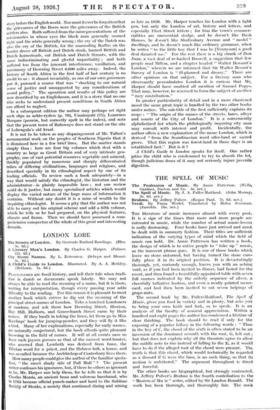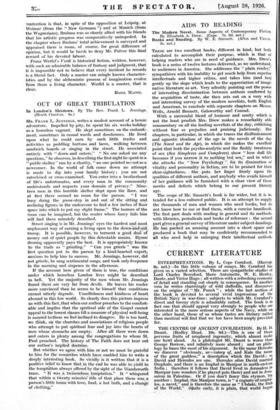THE SPELL OF MUSIC
THE literature of music increases almost with every post. It is a sign of the times that more and more people are interested in music, while the number of actual music-lovera is sadly decreasing. Four books have just arrived and must be dealt with in summary fashion. Their titles are sufficient indication of the varying types of mind which the field of music can hold. Dr. Annie Patterson has written a book, the design of which is to entice people to " take up " music, as the innocent phrase goes. It is one of those books which leave no stone unturned, but having turned the stone care• fully place it in its original position. It is devastatingly thorough, yet, curiously enough, leaves you with an aching void, as if you had been invited to dinner, had fasted for the event, and then found a beautifully appointed table with seven full courses indicated by the orderly sequence of silver, a cheerfully talkative hostess, and even a neatly printed menu- card, and had then been invited to eat seven helpings of
grape-nuts.
The second book by Mr. Fuller-Maitland, The Spell of
Music, gives you food in variety and in plenty, but asks you to bring your own knife and fork, so to speak. It is an analysis of the faculty of musical appreciation. Within a hundred and eight pages the author has condensed a lifetime of clear thinking. The book should be read if only for the exposing of a popular fallacy in the following words : " Thus in the key of C, the chord of the sixth is often stated to be an inversion of the dominant seventh with the root, G, left out but that does not explain why all the theorists agree to allow the middle note to rise instead of falling to the E, as it would have to do if the alleged root of the chord were present. The truth is that this chord, which would technically be regarded as a discord if G were the bass, is no such thing, so that its motion is unfettered." The argument throughout is direct and forceful.
The other books are biographical, but strongly contrasted. Mr. Jeffrey Pulver's Brahms is the fourth contribution to tho "Masters of Mu is " series, edited by Sir Landon Ronald. The work has been thorough, and thoroughly fair. The malt contention is that, in spite of the opposition at Leipzig, at Weimar (from the " New Germans ") and at Munich (from the Wagnerians), Brahms was so closely allied with his friends that his artistic progress was comparatively unimpeded. In the -chapter where Brahms' total achievement is surveyed and appraised there is room, of course, for great difference of opinion, but it would be harsh to deny Mr. Pulver this final
reward of his devoted labour. - .
Franz Werfel's Verdi is historical fiction, written, however, with such an admirable balance of fantasy and judgment, that it is impossible not to believe that every incident he records is a literal fact. Only a master can mingle known character- isties and by the alchemistic process of imagination evolve frOm them a living character. Werfel is a master, that is clear.
BASIL MAINE.







































 Previous page
Previous page